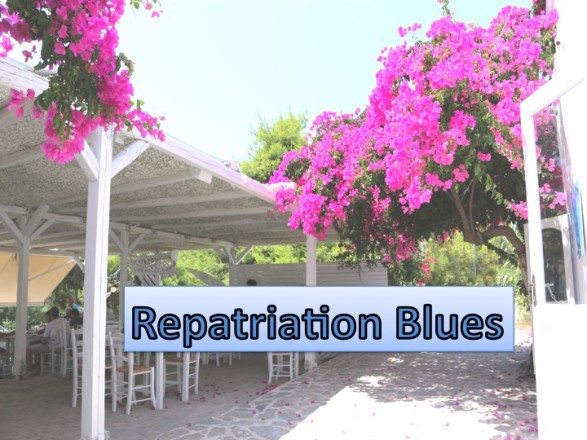Repatriation Blues – Tips on How to Go Back to your Home Country

Like many of my fellow expatriates, I believed that going back home after spending time abroad should have been a piece of cake.
The experience of repatriation triggered a series of uncomfortable feelings and shocked me. Although I sounded like a Brazilian, I dressed differently, could not fully understand the local news, and felt out of place when surrounded by my compatriots. I didn’t fit in.
What was the missing piece? If I didn’t feel at home in my country, where else did I belong?
The answers weren’t straightforward, as I had never heard of the term repatriation.
Repatriation is the process of returning a person to their place of origin or citizenship.
In my case, through a series of trials and errors, I eventually found out where I belonged.
So, how can you avoid common mistakes expatriates make when it’s time to go back home?
Here are 5 things I learned during my first repatriation and that helped during my second time going back to my birth country.
Prepare and Plan Ahead– It’s been said many times, and it is worth repeating – prepare to go back to your country, in the same way you got ready before moving to a foreign land. Preparation can happen even during your stay abroad. Instill values related to your culture in yourself and family members while away from home. If you are living in a country where having a full staff of house help is the norm and know that back home no help is to be expected, you can teach your children how to do house chores as they grow up overseas. This simple activity will facilitate the transition back and teach an aspect of your culture.
Further, when it is time to move back, understand what your current needs are. If while abroad you developed a taste for ethnic food, by planning ahead you may be able to continue enjoying international cuisines. My family and I feel at home when surrounded by globalized people – so, we searched for cosmopolitan cities as home locations instead of just moving back to where we lived before our time abroad.
Manage your Assumptions – Although we understand that during our stay overseas we changed, it seems hard to believe that our country has modified by the same degree we did.
Our family members, friends, and co-workers, tend to see our situation from a different angle. They find it difficult to conceive that we have transformed so much that now we require readjusting to our original culture.
It’s also relevant to assess our personal assumptions when moving back home. We lived and survived in a foreign country and it may have been an amazing experience. However, life also continued at our previous place of residence while we were gone. All these life events combined are of equal importance to those involved and awareness of this fact may help us understand some of our new viewpoints and attitudes from others towards us.
It’s common for expatriates to idealize their home countries while living abroad. We were homesick. Upon returning, though, we are stunned by the feelings we may experience towards some people and towards the place we used to call our own. It is more common than we think that returnees are startled when they find little in common with some old friends and even family members.
Be gentle with yourself during this transition phase and allow time to evaluate your new situation.
Expect Re-entry Shock – It is ironic that some sources tell us that those who were successful in immersing themselves in a foreign culture have the most difficult time repatriating. (http://www.evergreen.edu/studyabroad/docs/reentryshock.pdf)
Feelings of being disconnected, out of place or undervalued are some of the reactions experienced by expatriates transitioning back home. Boredom, missing our life abroad, being restless, and desiring change, all go hand and hand with repatriation.
I find Robin Pascoe’s description on how we may feel during this time rather accurate. “Re-entry shock is when you feel like you are wearing contact lenses in the wrong eyes. Everything looks almost right.” Pascoe is the author of “Homeward Bound.”

Avoid Hiding your Life Overseas – It’s no secret in the expat world that many of us filter personal information about our lives overseas. We aspire to be accepted and not scare away friends and family. There is a misconception that expat-living is a series of adventurous traveling, fancy dining, luxurious life with household help, and for accompanying female spouses – we are portrayed as “madames.”
While we should be selective with whom we want to share our life stories, hiding our past won’t improve or shorten our adaptation phase upon repatriation.
These four simple and non-invasive ways of sharing my experiences abroad may be of help to you as they were for me:
- Cook dishes from your prior countries for friends and family. During my last repatriation, I became the chocolate cookie and Tex-Mex salsa maker in my São Paulo community.
- Decorate the house with items brought from the places where you lived. Visitors invariably ask about these objects, and you get to share a little about your experience in a non-confronting way.
- Create photo albums using images from your time overseas. By placing these books in view, guests may learn a little more about your experience and therefore relate to you.
- Make your gifts original and related to your previous culture/s. My favorite way of sharing part of my international life is to give souvenirs as presents. The person who receives the gift is usually touched by my desire to include them into my international life.
Get support – When it comes to getting support, it’s important to do the same things we did when we expatriated – create positive social interactions, find meaningful work, and avoid toxic people, to name a few.
It’s also crucial that we don’t neglect to locate a local mentor and to find a like-minded group of new friends. Many times, returning expats rationalize that we already have friends in our country, and there is no need of a mentor since we know our way around.
That’s exactly how I thought when I went back to my home country.
Luckily, I received a phone call that changed my life. Another global person, also a Brazilian, invited me to a foreigners group’s lunch. Initially, I resisted attending a newcomers’ group, after all, I was a native to the land.
The upside is that after joining, I immediately had new friends. And I have to admit that I owe my favorable repatriation to this group. By finding an entryway into the international community, I received the support I needed and found my new home.
The point is that we cannot limit ourselves to being the person we were, and the situations lived before we left our countries. Our acquired experiences abroad changed us. By acknowledging this transformation and processing our repatriation with care, we empower ourselves to move forward with confidence





